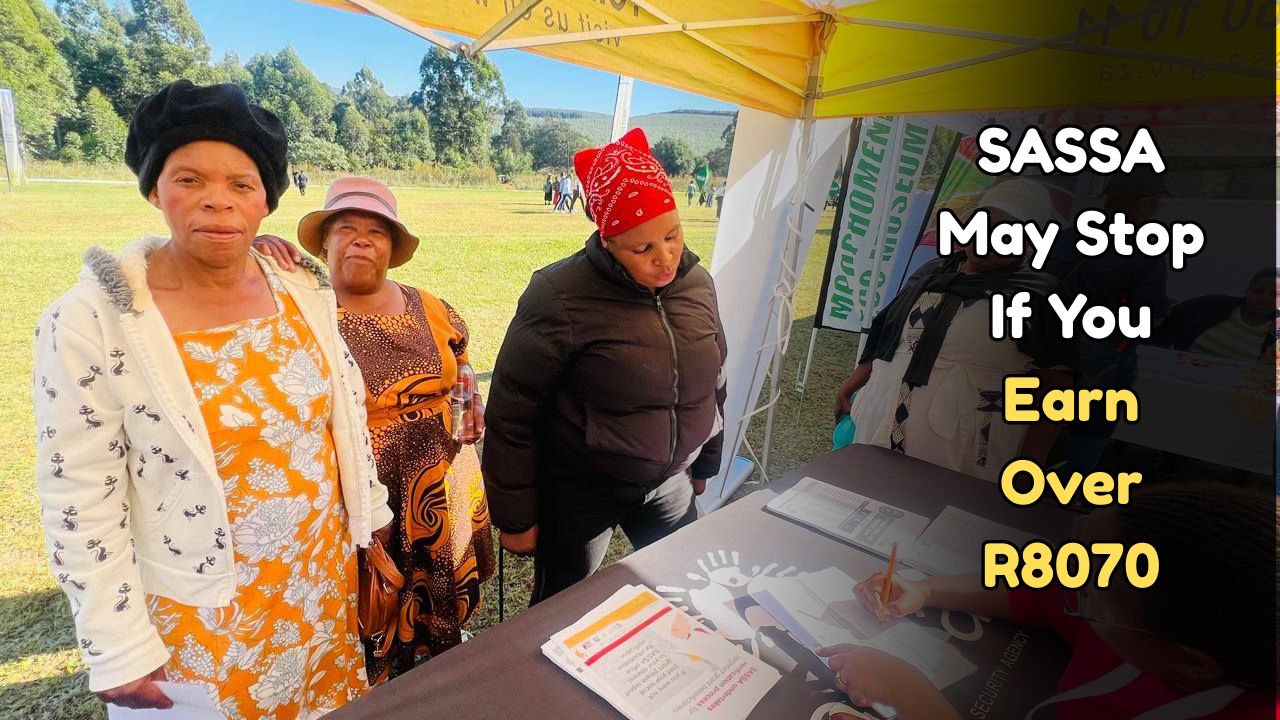High-Earner Warning – South African Social Security Agency (SASSA) beneficiaries are urged to check their monthly income if it is at or above R8,070. If your earnings, deposits, or banked support regularly push you over this limit, your grant may be stopped after 15 August. The warning is tied to means-test reviews and automated bank checks that compare what you receive with what you declared when you applied. It includes wages, contract work, business sales, rental income, and recurring transfers from family or partners. Even once-off lump sums, like a severance payout or policy withdrawal, can trigger a review if they land in your account during the assessment period. To protect yourself, keep proof of income, label deposits clearly, and update SASSA when your situation changes. If your salary has dropped, or a deposit is a loan you must repay, keep written evidence. Accurate records and timely updates reduce the risk of a mistaken suspension and help your payments continue smoothly.
Why Payments May Stop After 15 August
SASSA runs periodic means-test checks to confirm that beneficiaries still meet income rules. Around key audit windows, such as mid-month or deadline periods, the system compares your latest bank data with your declared earnings. If regular deposits show more than R8,070 a month, the system can automatically flag your profile and place your grant on hold while officials review the case. This hold prevents overpayments and allows SASSA to request supporting documents like payslips, bank statements, affidavits, or letters showing that a deposit was temporary or not your income. Holidays, public-sector pay cycles, or once-off refunds can coincidentally spike an account and trigger a stop. That is why keeping a paper trail matters. If you respond quickly with clear evidence, reviews are usually faster, and payments can resume. If you ignore SMS or email requests for documents after 15 August, the suspension can extend, and arrears may not be guaranteed.
Who Is Affected And What Counts As “Income”
This warning mainly affects beneficiaries whose grant type is subject to an income threshold, including those receiving Older Persons, Disability, or Care-dependent support, and households where total inflows may exceed the limit. “Income” is broader than a monthly salary. It often includes freelance and contract payments, micro-business sales, room rentals, airtime/advance payouts that land as cash, and regular transfers from relatives or partners. Banked stipends, bursaries with living allowances, and policy or savings withdrawals can also appear as income during an assessment window. If you share an account with a family member, their deposits might be misread as yours. Likewise, marketplace sales or courier cash-on-delivery totals can inflate your bank balance. Keep separate personal and trading accounts where possible, ask senders to add clear payment references, and retain invoices or IOUs. Documenting the true source of funds helps SASSA distinguish genuine income from temporary or third-party deposits.
What To Do Before The Deadline
Act early if your recent inflows look close to or above R8,070. First, download the last three months of bank statements and highlight each deposit with a note: salary, once-off refund, loan from cousin, sale of fridge, etc. Second, gather proof—payslips, receipts, loan agreements, or messages confirming that a deposit must be repaid. Third, update your details with SASSA: new employer, reduced hours, job loss, or business closure. If you received a once-off payout (insurance, funeral policy, or severance), prepare a brief letter explaining it will not continue. Fourth, avoid mixing grant funds with side-hustle cash; use separate accounts where feasible. Fifth, watch for SASSA SMS or email requests and reply within the stated timeframe. Fast, complete responses reduce review time. Finally, if you are safely below the limit, keep records anyway—clean paperwork today prevents delays if the system flags your account after 15 August.
If Your Grant Is Stopped: Appeal And Reinstate
If your payment is placed on hold, do not panic. Start by reading the reason code in the SMS or online portal and note the document list requested. Submit the latest bank statements, payslips, and any letters that prove a flagged deposit was a once-off or not yours. Add an affidavit if needed, explaining the source, date, and why it should not count as ongoing income. If your earnings recently dropped below R8,070, include proof of reduced hours, contract termination, or business slowdown. Keep copies of everything and ask for a reference number when you submit. If the review outcome remains negative, file an appeal within the stated window and attach any missing documents. You can also request a reassessment for the next cycle if your circumstances changed. Many suspensions are reversed when clear evidence is provided, and compliant beneficiaries often receive reinstated payments from the following pay run.
